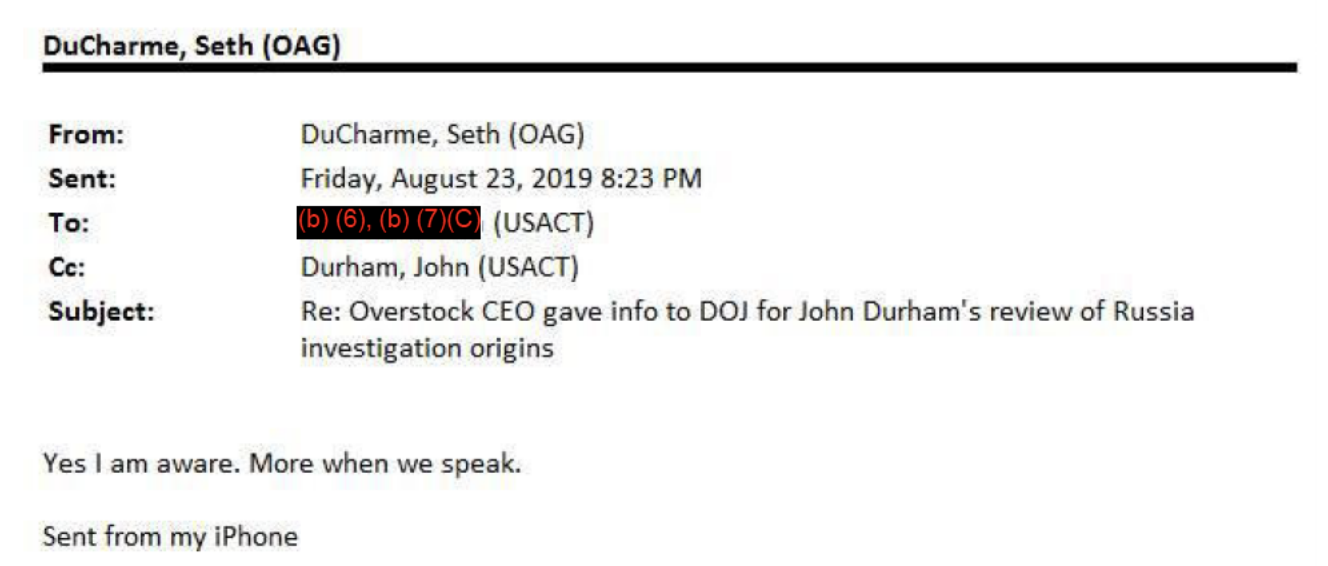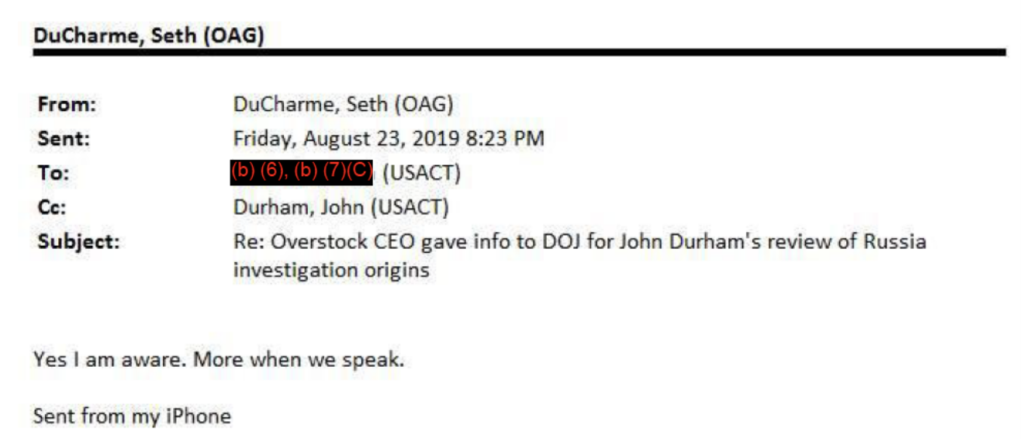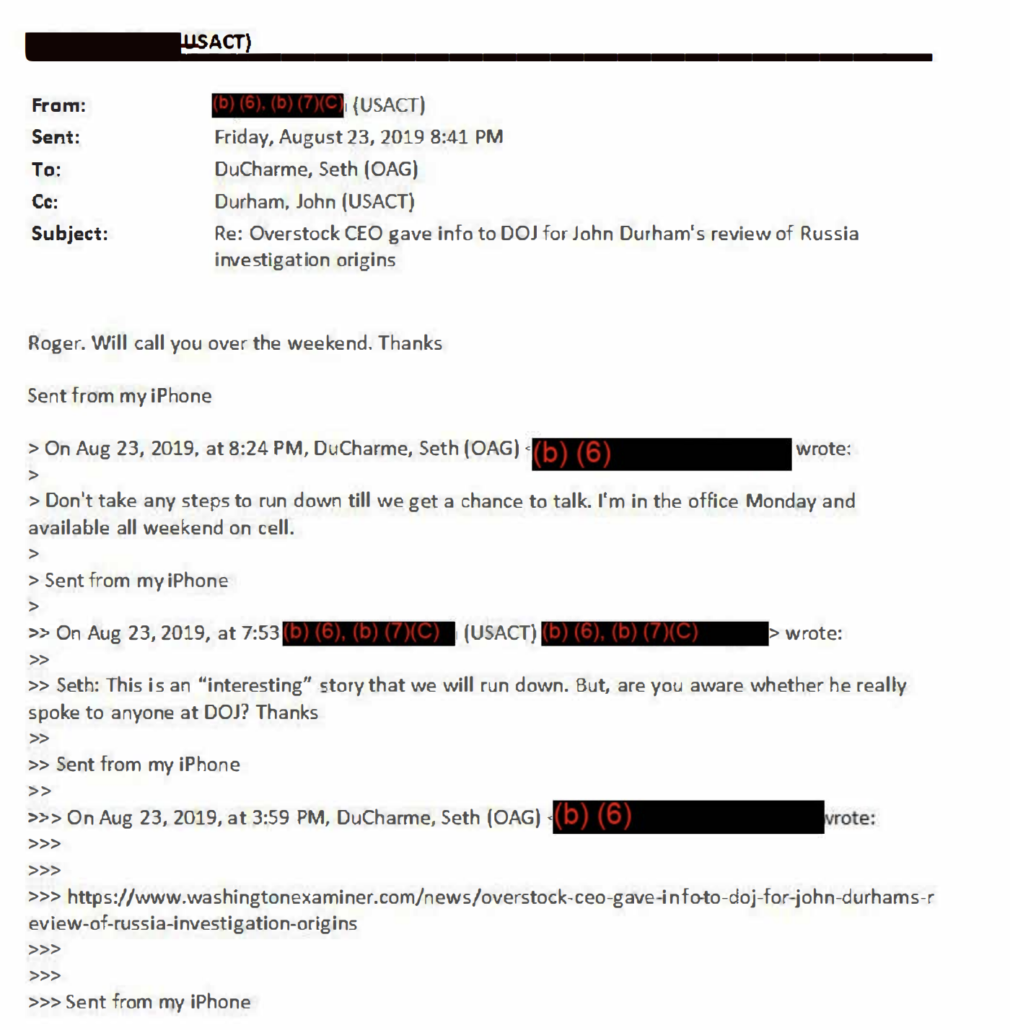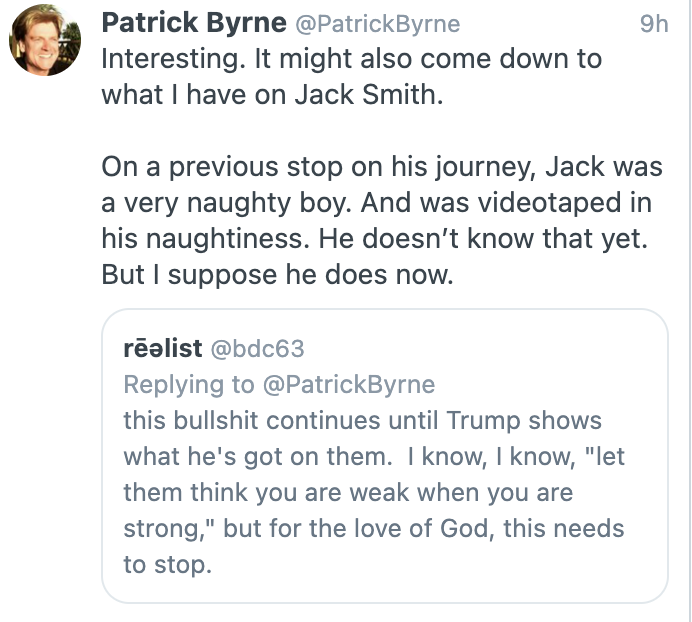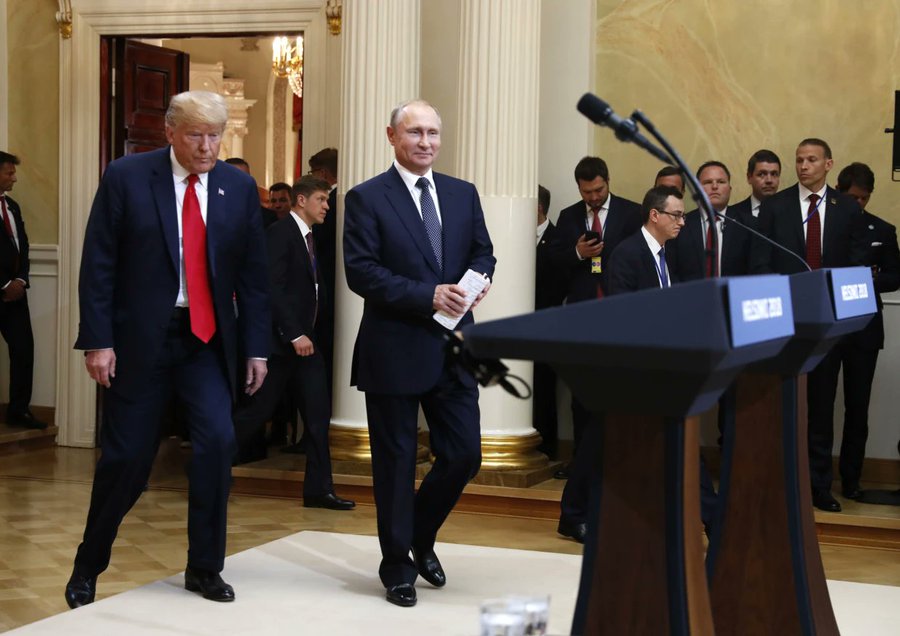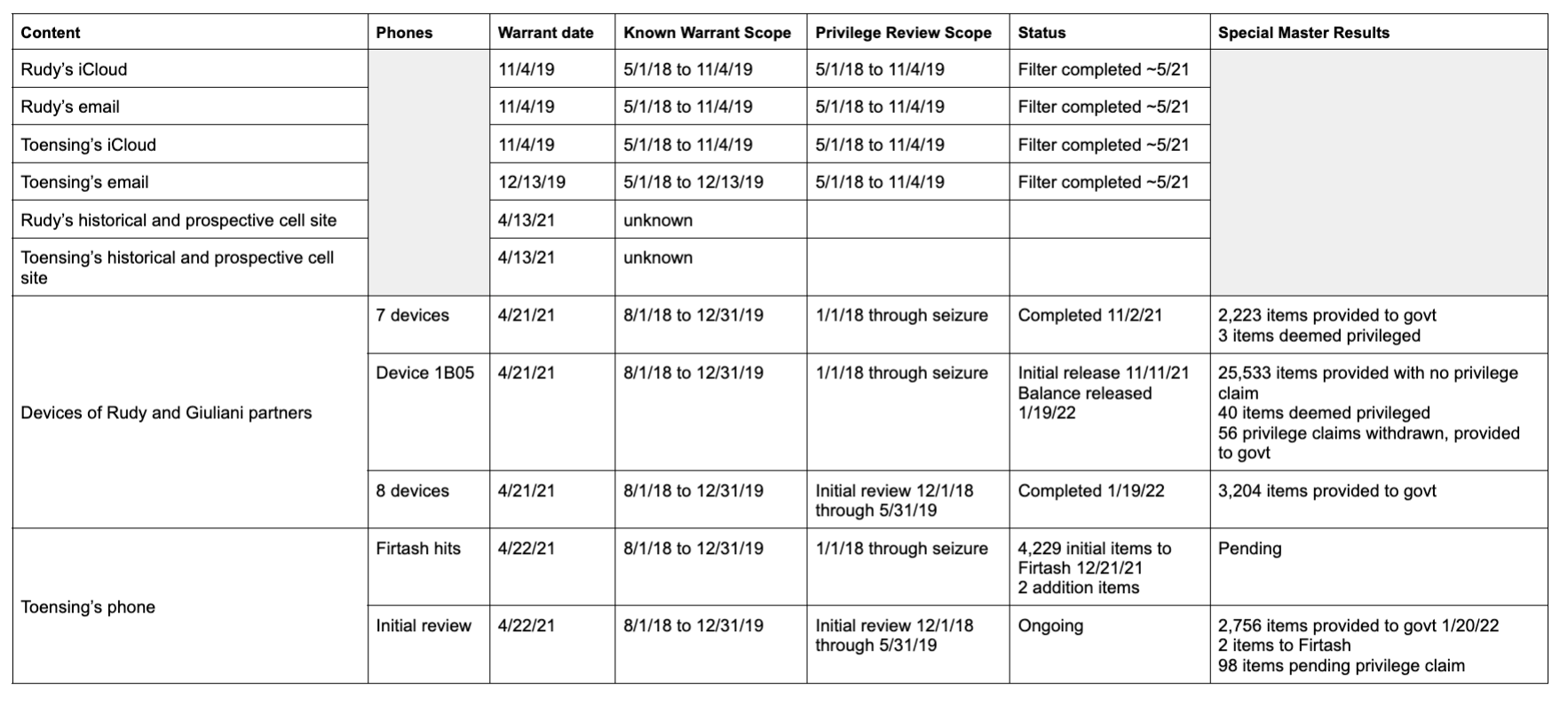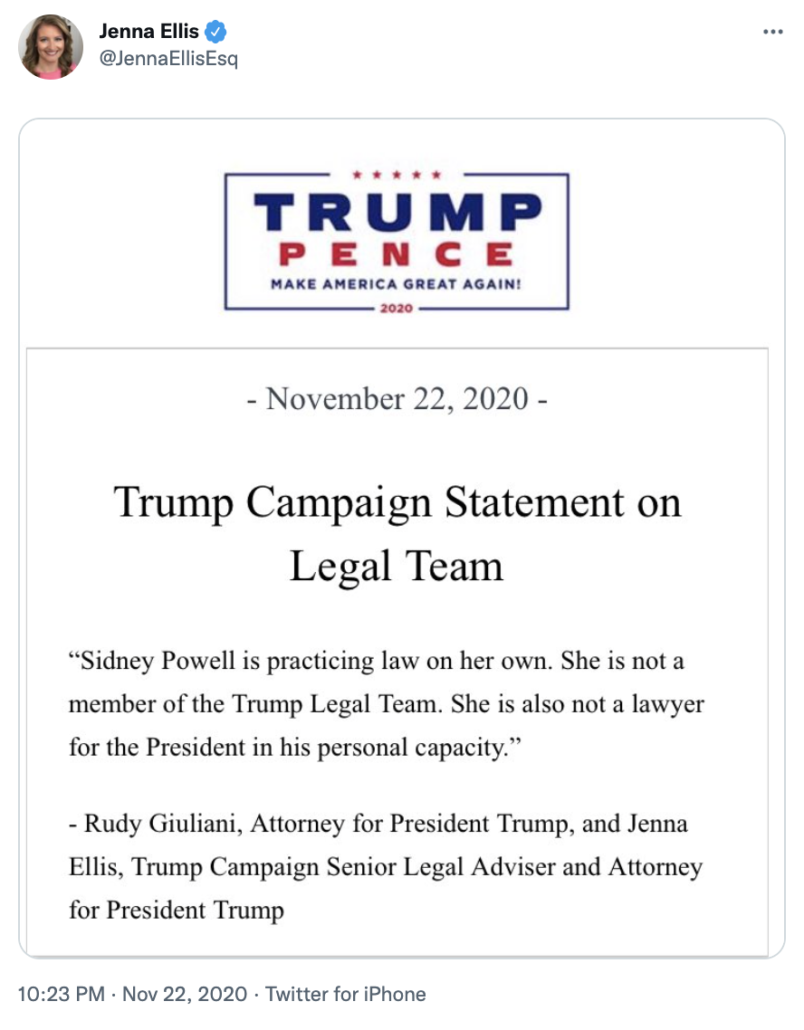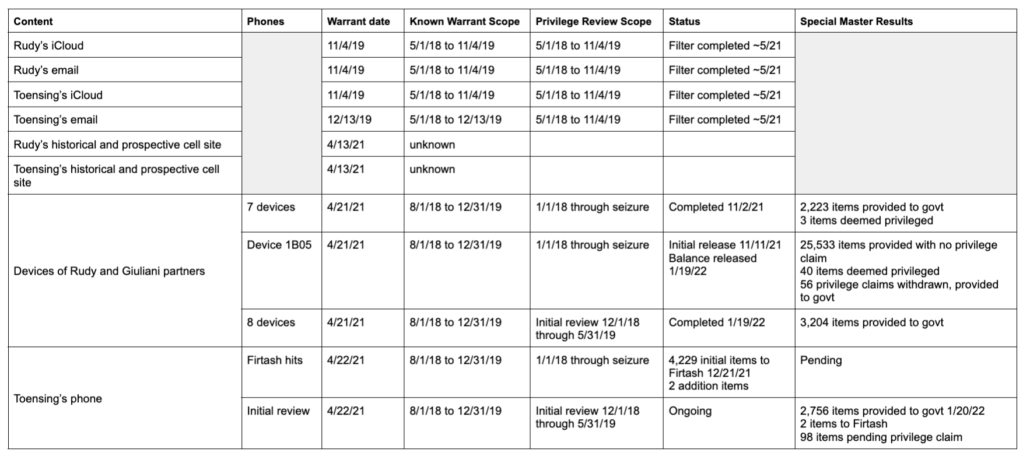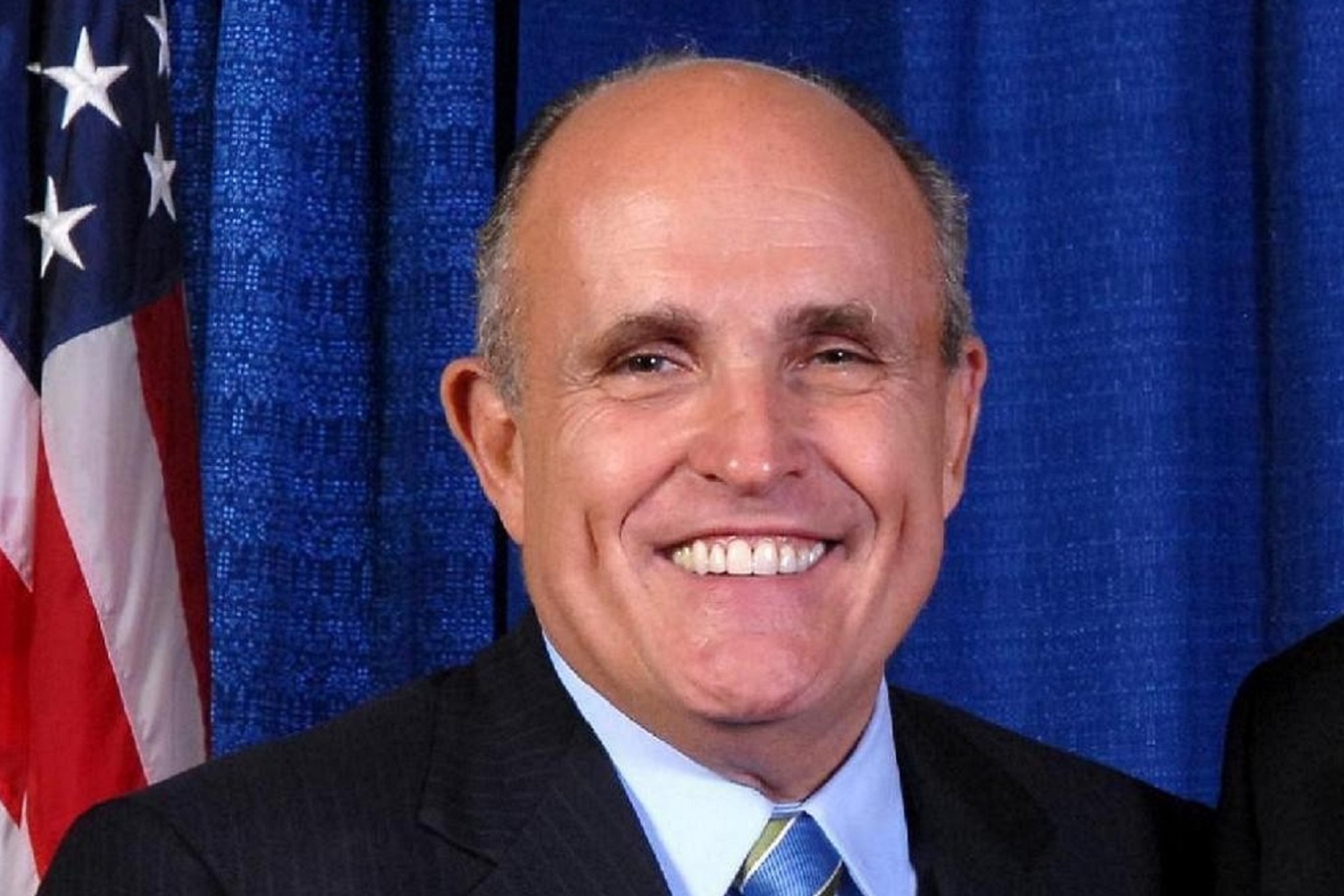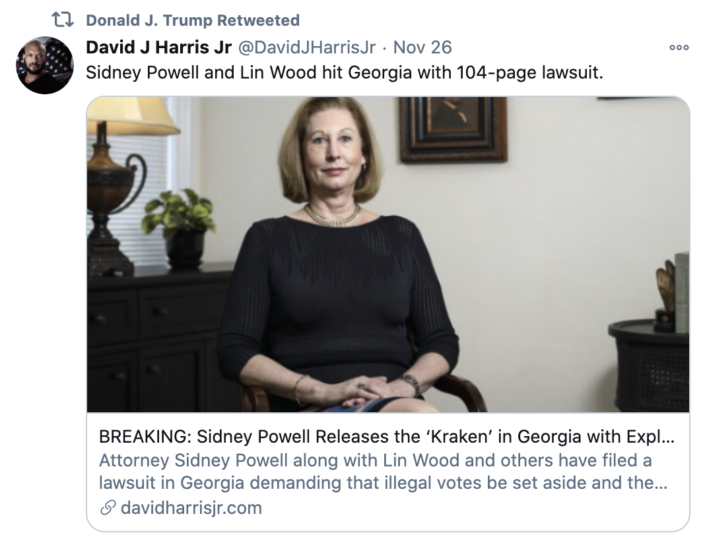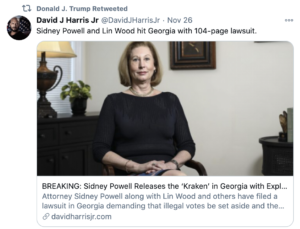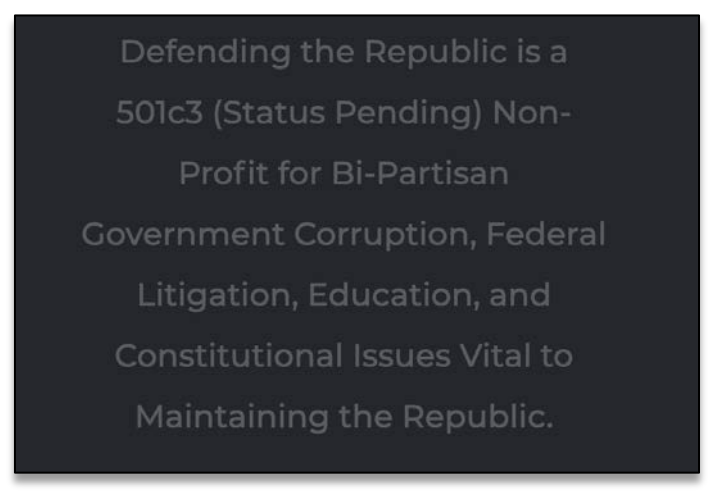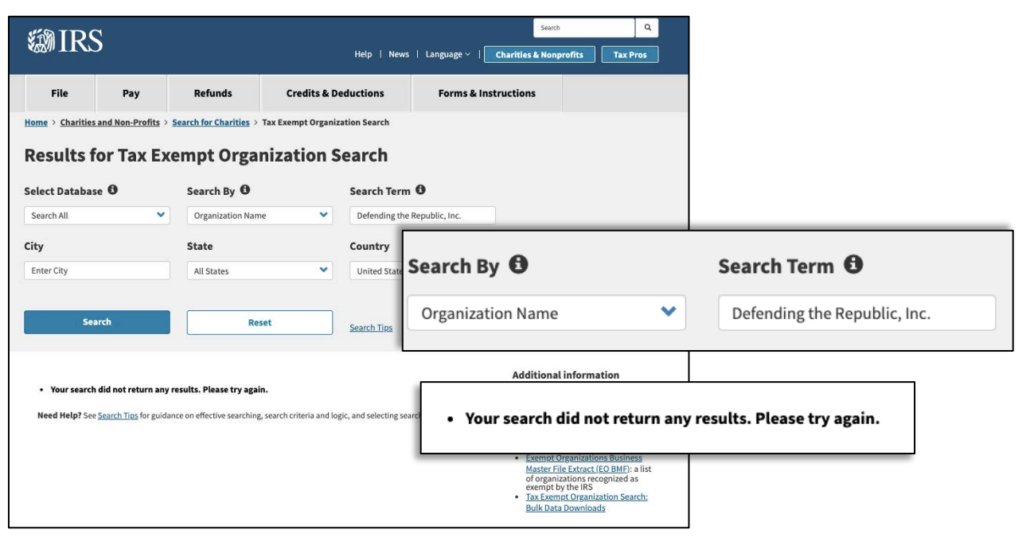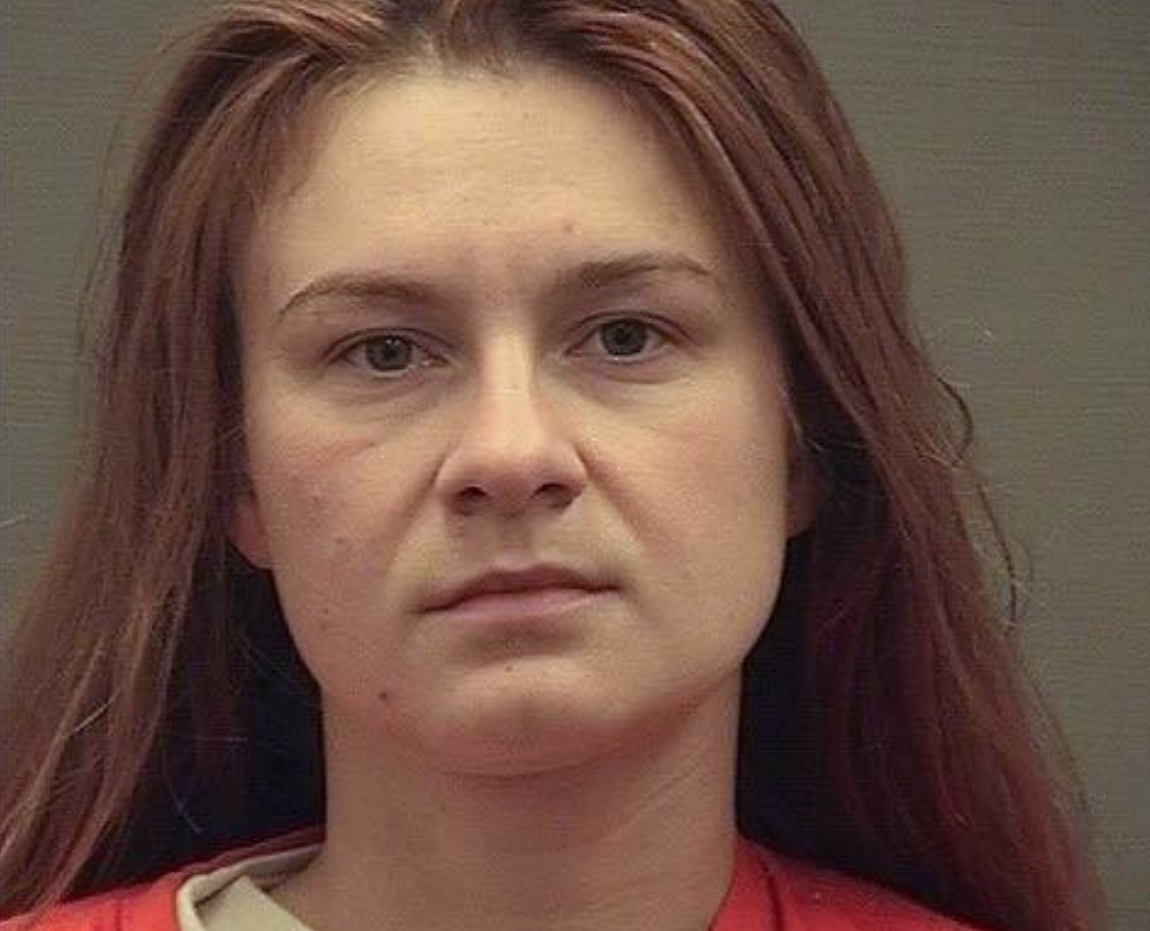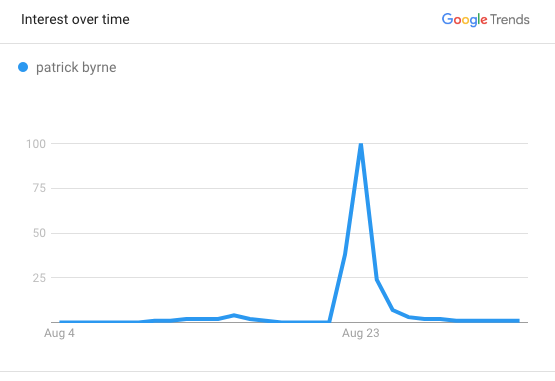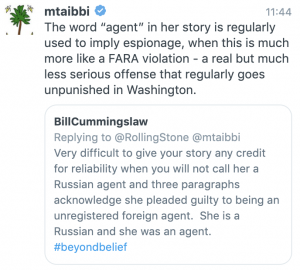There are a number of inconsistencies and sketchy claims (about who he thinks was targeted by the FBI and the timing of his disclosures) in former Overstock CEO Patrick Byrne’s claims (Sara Carter’s story, NYT story, Fox Interview, Seth Hettena Q&A, Chris Cuomo interview) that he had been a “non-standard” informant for the FBI about Maria Butina.
The short version is that she sought him out in July 2015, telling him Aleksandr Torshin had asked her to do so, then started a sexual relationship with him, then later turned her attention to networking with presidential campaigns. All along the way, Byrne claims, he kept the FBI informed and acted on their requests regarding his relationship with Butina. Then, 9 months after she was arrested, in April 2019 and at a period too late to help her sentencing, he reached out to the FBI and first without counsel (in spite of his claim to Fox that a big Republican lawyer told him he’d go to jail for the rest of his life over this) and then with a lawyer told the FBI what had happened. He attributes coming forward to a conversation with Warren Buffet, though Buffet claims not to know what he was involved with.
I may return to the oddities in Byrne’s story.
For now, however, I’d like to examine what her lawyer Robert Driscoll has claimed about Byrne.
In a letter to John Durham, DOJ’s IG, and OPR (shared with Carter), Driscoll suggested that he should have been provided details of what Byrne shared with the FBI as Brady information.
By email, letter, phone, and in person, the defense repeatedly pressed the government for any Brady material and was not provided any. In particular, we suggested to the government a strong suspicion that counterintelligence or other FBI investigators used confidential informants (“CIs”) in their investigation of Maria, and that information provided by such witnesses to the government might be relevant to guilt or sentencing. Moreover, we suggested that the government had presented Maria with one or more “dangles” — that is, orchestrated opportunities to provide the government information unwittingly while being observed.
In writing, the government denied the existence of any such Brady material. Orally, during debrief sessions with Maria, I directly told the government that I believed Patrick Byrne, Chief Executive of Overstock.com, who had a sporadic relationship with Maria over a period of years prior to her arrest, was a government informant. My speculation was flatly denied. My associate Alfred Carry made similar assertions in a separate debrief that he covered and was also rebuffed.
Mr. Byrne has now contacted me and has confirmed that he, indeed, had a “non-standard arrangement” with the FBI for many years, and that beginning in 2015 through Maria’s arrest, he communicated and assisted government agents with their investigation of Maria. During this time, he stated he acted at the direction of the government and federal agents by, at their instruction, kindling a manipulative romantic relationship with her. He also told me that some of the details he provided the government regarding Maria in response was exculpatory — that is, he reported to the government that Maria’s behavior with him was inconsistent with her being a foreign agent and more likely an idealist and age-appropriate peace activist.
[snip]
Byrne evidently informed the government of many meetings with political and other figures that Maria had mentioned to him, often in advance of the meetings themselves. The government did not try to intervene or try to stop any meetings, nor did they express any concern. (This undercuts the government’s position at sentencing that Maria’s activities involved collection of information that could be of “substantial intelligence value to the Russian government” or pose a “serious potential to harm U.S. foreign policy interests and national security” as those same activities were observed and permitted for years.)
At some point prior to the 2016 election, when Byrne’s contact with Maria diminished or ceased, the government asked and encouraged him to renew contact with her and he did so, continuing to inform the government of her activities. Byrne states he was informed by government agents that his pursuit and involvement with Maria (and concomitant surveillance of her) was requested and directed from the highest levels of the FBI and intelligence community.
As time passed, Byrne became more and more convinced that Maria was what she said she was–an inquisitive student in favor of better U.S.-Russian relations–and not an agent of the Russian government or someone involved in espionage or illegal activities. He states he conveyed these thoughts and the corroborating facts and observations to the government.
Now, I absolutely don’t rule out the government withholding information that would be helpful to the defense. They do that far too often, and there are good reasons to doubt the prosecutors in this case. But Driscoll’s claim that this might be a Brady violation is premised on two things: first, that the FBI really considered Byrne an informant — which is what they denied when asked directly — and that the FBI considered anything he gave them to be exculpatory.
In fact, the story Byrne told is actually quite damning to Butina. From the very start, according to what he told Sara Carter, Butina was pursuing him, not vice versa. She told him, from the very start, she had been sent by Torshin and explained (credibly, given Putin’s interests) they were interested in Byrne because of his involvement in blockchain technology. And her offer of a trip to Russia with networking there matched her M.O. in approaching the NRA.
Byrne revealed details about his intimate relationship with the Russian gun right’s activist Butina. Byrne was a keynote speaker on July, 8, 2015 at Freedom Fest, a yearly Libertarian gathering that hosts top speakers in Las Vegas. Shortly after his address, Butina approached him. She told him she was the leader of a gun right’s organization in Russia. He congratulated her, spoke to her shortly, but then “brushed her off.”
The young redheaded Russian graduate student then approached him again over the course of the conference and explained that she worked for the Vice Chairman of the Central Bank of Russia and sent by them to make contact with Byrne.
She also said “Did you know you’re a famous man in Russia in certain circles? We watch your Youtube videos, we know about your relationship with Milton Friedman.”
She said she was appointed to lead Russia’s gun right’s group by Lieutenant-General Mikhail Kalashnikov, who was a Russian general, most notably known for his AK-47 machine gun design. Byrne says he considered the designation by Kalashnikov a significant honor, a signal of a kind he knows some mythical figures make on their way out. Byrne then had an “extensive conversation about Russian history and political situation. Butina told him that the purpose of her visit was primarily to extend an invitation to Byrne to come to Russia to speak at the Central Bank. After that, there would be a trip to a major resort to meet with various intellectuals and dignitaries from the Russian power structure. Butina told Byrne the event would offer him the opportunity to meet senior Russian officials and oligarchs. She wanted to see Byrne again to start preparing him for such a trip.
Even more significantly, as Byrne tells it, after Butina first suggested she was using a romantic relationship with him as cover to explain their communications, she’s the one who first pushed sex.
He rented a hotel room with two bedrooms because he was under the impression that the romantic texts were simply her way to cover for communicating with him. However, she arrived at the hotel beforehand, occupied the room before Byrne’s arrival, and when he arrived, she made clear that her flirtatious texts were not simply a disguise.
And Byrne claims he grew quite alarmed by Butina’s interest in networking with political campaigns.
“Eventually, her conversations became less about philosophy and it became clear that she was doing things that made me quite uncomfortable,” stated Byrne. “She was basically schmoozing around with the political class and eventually she said to me at one point I want to meet anyone in the Hillary campaign, the Cruz, the Rubio campaigns.”
Butina had also told Byrne, that Torshin, the Russian politician who she had been assisting while she was in the U.S., had sent her to the United States to meet other libertarians and build relations with political figures.
Byrne also claims he told Butina she needed to disclose her activities to the government, something that directly contradicts what Butina claimed repeatedly during the sentencing process, that, “If I had known to register as a foreign agent, I would have done so without delay.”
Byrne said he warned Butina: “Maria the United States is not like Russia, and knowing powerful people ‘like oligarchs and politicians’ won’t help if the FBI believes a line has been crossed.” Byrne believed Butina was naive but not blameless. He said during the interview, “If you’re reporting to any Russian official as you’re doing this stuff and not disclosing yourself here, there are these men in black here and they don’t really give a shit who you know here -that’s not going to save you.”
It is true that Butina repeatedly told him she wasn’t a spy and Byrne ultimately became convinced that was true. But even in his description of that, he told Carter that he believed Butina was being used by US and Russian intelligence, not that he believed she had no tie to intelligence.
Although Byrne was concerned about Butina’s possible motives, he eventually became convinced that she was an intellectual being used by both the Russians and American intelligence apparatus. She was stuck between two highly contentious and secretive governments, he claimed. He relayed those concerns to the FBI, he said.
If that’s what he told the FBI, it does nothing to make her any less of an unregistered agent of Russia.
Very significantly, though, Butina’s involvement with Byrne during the period she was supposedly in a meaningful romantic relationship with Paul Erickson refutes the claims her attorneys have made about that relationship.
As I have laid out, from the very start, Driscoll portrayed the government’s claim that she caught Paul Erickson in a honey pot as sexism, with mixed success.
Then there’s the specific government insinuation that Butina was engaged in a honey pot operation. It substantiates this two ways — first, by suggesting she’s not that into Erickson.
Further, in papers seized by the FBI, Butina complained about living with U.S. Person 1 and expressed disdain for continuing to cohabitate with U.S. Person 1.
It also alleges she offered sex for favors.
For example, on at least one occasion, Butina offered an individual other than U.S. Person 1 sex in exchange for a position within a special interest organization.
Driscoll pretty convincingly argues the government misinterpreted this last bit.
The only evidence the government relied on for its explosive claim was an excerpt from an innocuous three-year-old text exchange (attached as Exhibit 3) sent in Russia between Ms. Butina and DK, her longtime friend, assistant, and public relations man for The Right to Bear Arms gun rights group that she founded.
DK, who often drove Ms. Butina’s car and thus was listed on the insurance, took the car for its annual government-required inspection and insurance renewal, and upon completion, texted (according to government translators), “I don’t know what you owe me for this insurance they put me through the wringer.” Ms. Butina jokingly replied, “Sex. Thank you so much. I have nothing else at all. Not a nickel to my name.” DK responded: “Ugh . . . ( ”—that is, with a sad face emoticon.
Aside from the fact that Maria is friends with DK’s wife and child and treats DK like a brother, the reference to sex is clearly a joke.
We still haven’t seen the government response to this, but what Driscoll presents does support his claim this is a “sexist smear.”
But Driscoll’s dismissal of the other claim — that Butina disdained living with Erickson — is far less convincing.
[I]n response to her girlfriend’s own complaints about her boyfriend’s failure to call in three weeks (accompanied by an angry face emoji) that Maria responds that her own boyfriend (Mr. Erickson) has been “bugging the sh*t out of me with his mom” and that she has “a feeling that I am residing in a nursing home.” “Send a link to the dating app[,]”
Driscoll spins this as an attack on Erickson’s now late mother, but doesn’t address the central allegation that she likened living with her much older boyfriend to living in a nursing home. Nor that she started the exchange by saying “let’s go have some fun with guys!!!” because she was “Bored. So there.” Furthermore, Butina seemed concerned that her use of Tinder would become public because she logged in using Facebook.
Though he has been sharing schmaltzy videos of Butina and Erickson with ABC, Driscoll also doesn’t address the fact that as early as May, Butina was proffering to flip on Erickson in fraud charges in South Dakota, which would have the effect of putting her in a position to negotiate permanent visa status independent of him, while limiting her own legal exposure.
Even in her sentencing memo — long after he knew of her relationship with Byrne, according to his public statements — Driscoll claimed she moved to the US in 2016 so she could be in the same hemisphere as Erickson.
On a personal level, Erickson and Maria kept in touch after the 2013 meeting and she began a romantic relationship with him in the following year.
[snip]
She also wished to be in the same hemisphere as her romantic interest. So Maria and Erickson explored both educational and business opportunities for her. This is the genesis of the Description of the Diplomacy Project proposal referenced in the Statement of Offense.
Among the events Butina planned to attend as part of that Diplomacy Project was the July 8-11 Freedom Fest convention where she first sought out Byrne. And before she moved to the US, she was already involved sexually with Byrne, according to his claims.
The portrayal of Butina’s relationship with Erickson as true romance has long been suspect — not only did she offer to flip on him in May 2018 (in exchange for which she might have gotten a permanent visa), but she did flip on him months before her plea deal. But if Byrne’s claims are true, it suggests she was using sexual relationships to help network in the US, and it further suggests Driscoll knew that when making claims about the import of her relationship with Erickson. If the FBI did obtain information from Byrne they chose (justifiably or not) not to release to defense attorneys, it might explain why they believed she was operating as a honey pot: because that’s what Byrne told them happened to him.
In his public comments to the NYT, Driscoll explained that Butina didn’t want to settle down (the implication is, with Byrne; he has claimed she wanted to settle down with Erickson).
“I think she admired him, but I don’t think she was looking to settle down,” Mr. Driscoll said.
In his comments to Carter, he suggests that he suspects there were other sources for the FBI.
Driscoll said there was suspicion that the FBI did not disclose all the information it had on Butina and he stated that he believed “Patrick is not the only one” who was giving information to the FBI.
“We’ve thought of several possibilities and some we are more confidant than others. I’m firmly convinced,” said Driscoll, who shared numerous letters and emails with this reporter that he exchanged with the FBI.
A seemingly disturbed homeless man, Hamdy Alex Abouhussein, who has asked to submit an amicus brief in Butina’s appeal (the public defender whom Judge Tanya Chutkan appointed to make sure that Driscoll had no conflicts when she pled guilty, AJ Kramer, is representing her in her appeal) claimed (incorrectly) that he’s the reason Butina got thrown into solitary and that FBI used Butina as a dangle to entrap him. So he also claims to have tried to provide exculpatory information.
Plainly, one cannot tell exactly when, before accepting Butina’s guilty plea, did Judge Chutkan learn of the jail’s blocking of Abouhussein’s letters to Butina, including his pictures, or the FBI dangle operation. Moreover, as the plea hearing transcript shows, Butina responded to the Judge’s sequence of questions about effectiveness of each of her then-three attorneys3, including the just-appointed for the plea negotiations role, A.J. Kramer4, who was yet to meet Abouhussein (they met outside the courtroom after the plea hearing, see pre-plea email from Abouhussein to Kramer, exh 2). Upon information and belief, Butina approved her attorneys’ performance only because they, under DOJ’s duress and a gag order, never informed her of the FBI dangle operation and surrendered to the prosecutors’ intimidation by keeping the dangle operation out of the public eye and trial record5. Admittedly, choice was either a rock or a hard place.
However, Judge Chutkan did sentence Butina to 18 months in prison after the notice of Abouhussein’s Amicus Brief Docket No. 77 was entered, which means Judge Chutkan was t/me/y presented with the “FBI dangle” and “letters blocked by Butina’s jail” Brady issues. Per Rule 51, this Honorable Court now has a lawful duty to investigate the issue of the FBI’s dangle operation that intentionally built up an oligarch-connected naive student as a false spy before casting her sex lure to hook the homeless Abouhussein, who was attending a public event at the Heritage Foundation to eat the free lunch as usual. Had he swallowed the lure6, any Grand Jury would indict this HamdySandwitch of a spy couple with ties to Putin, which explains Prosecutors’ honeypot sex allegations tainting Butina upon her arrest. Only in America!
So, yeah, there are other allegations, but Driscoll is right to suggest Byrne is more credible than, at least, this one.
But if Byrne’s story is credible, then it’s not clear that it helps Butina, at all, because it undermines the story her defense has been telling for a year.
Given her repeated assertions she’s happy with Driscoll’s representation, it’s unclear the basis for Butina’s appeal. I think the government operated in bad faith when they asked for 18 months, but that’s not a basis for an appeal. I think Driscoll made a mistake both by not arguing more forcibly that given the most relevant comparable sentence on 18 USC 951 charges, that of Carter Page recruiter Evgeny Buryakov’s 30 month sentence, a 9 month sentence would have been proportionate for someone like Butina who was neither recruiting nor operating covertly.
I also think that if Driscoll really cared about the declaration from former Assistant Director of FBI’s Counterintelligence Division, Robert Anderson Jr at her sentencing, he should have questioned what documents Anderson relied upon to judge that Butina was a spotter for Russian intelligence instead of deciding that, “I’m happy to leave the record as it is.” But if Driscoll had reason to believe the FBI had really damning information from Byrne that undercut his claims about Butina’s romance with Erickson, it might explain why he didn’t ask those questions.
The other day, Butina’s lawyer for her appeal AJ Kramer asked for an extension on his deadline to submit Butina’s appeal, which could mean he wants to add claims of Brady violations in her appeal (though he says he needs more time to consult the public record, and Driscoll and his associate Alfred Carry, by Driscoll’s own admission, never put their request for information about Byrne in writing).
But given Byrne’s public claims, it’s not actually clear that will help her case, as it mostly provides an explanation for why the FBI was so insistent on some of the allegations it did make.

